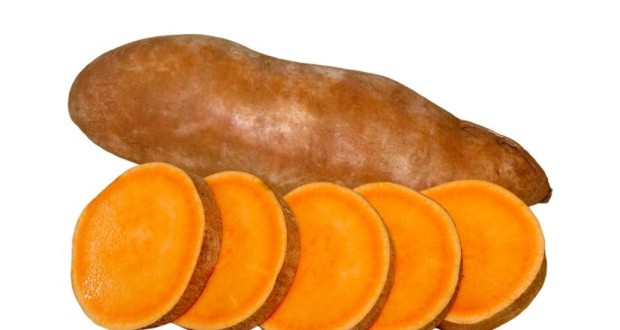It doesn’t take much research to learn that potatoes account for an enormous part of the modern American diet. The United States Department of Agriculture estimates that the average American consumes a staggering 117 pounds worth of spuds every year. This love affair with potatoes has sparked a longstanding debate about the health effects of this popular plant, with critics linking potato consumption to weight gain and spikes in blood sugar.
What tends to get overlooked in all this commotion, however, is that there are several different types of potatoes, including the often underappreciated sweet potato. Unlike the common white potato, which used for everything from French fires to potato chips, many Americans tend to ignore sweet potatoes altogether, save for maybe a cameo appearance during Thanksgiving. This lack of attention is quite unfortunate, since this sweet-tasting root vegetable is packed with valuable nutrients. If you still need convincing as to why sweet potatoes make for a good addition to your diet, check out the following facts below.
Filled With Fiber – In the past, you probably have heard medical experts extolling the values of fiber. This praise is well warranted, since fiber promotes digestive health and can also help prevent Type 2 diabetes and unwanted weight gains. Your typical sweet potato contains about 4 grams of fiber, which makes for a good start in getting your recommended daily intake of this key nutrient (38 grams for men, 25 grams for women).
A Good Source of Antioxidants – Free radicals might sound like the name of a rock band, but they are not to be taken lightly. In a nut shell, free radicals are molecules with an odd number of electrons. Not having an even amount of electrons doesn’t sit well with free radicals, who wander through the body searching for an electron to rectify this issue. The problem with free radicals is that they pillage healthy body cells in their quest for additional electrons. The resulting tissue damage can lead to development of certain diseases and noticeable aging.
Fortunately, nature has provided a remedy to free radicals in the form of antioxidants, which seek out and destroy these troublesome microscopic pests. Antioxidants can be found in a number of foods, among them sweet potatoes. The identities of some of the most potent types of antioxidants should sound very familiar – vitamins A and C are both renowned free-radical fighters. One cup of sweet potatoes contains 65% of your recommended daily value (DV) of vitamin C, and an eye-popping 769% DV of vitamin A.
A Lack of Calories – If you’re trying to shed excess pounds from your waistline, then you should be interested to know that sweet potatoes contain a relatively low amount of calories. One sweet potato of average size will only contribute 140 calories to your diet.
Potassium Powerhouse – When it comes to seeking dietary sources of potassium, many people opt for peeling a banana or two. To be sure, there’s nothing wrong with this approach, since an average sized banana has 23% DV of potassium. What many people fail to realize, however, is that sweet potatoes have bananas beat when it comes to potassium content (27% DV for just one cup of sweet potato). Your body has great use for potassium, using this nutrient to regulate blood pressure, strengthen its bones and assist with utilizing nutrients for energy.
Turn Back the Clock – While sweet potatoes can contribute greatly to a healthy diet, they probably won’t score that many points in the looks department. It may be somewhat surprising to learn, then, that sweet potatoes can improve the appearance of your face. According to a recent study published in the American Journal of Clinical Nutrition, participants who consumed 4 milligrams of vitamin C daily reduced their number of wrinkles by 11 percent (the study followed its volunteers over a thee year span). As stated earlier, sweet potatoes are a vitamin C goldmine.
A Lower Glycemic Index – A food’s glycemic index indicates how it affects the body’s blood sugar levels. An item with a high GI level can cause blood sugar levels to rise after it is eaten, eventually leading to increased thirst, disorientation and flu-like symptoms. Sweet potatoes have a relatively low GI rating, though their GI soars to high levels after being baked for 45 minutes.
 Natural Knowledge 24/7 Educate yourself with nutrition, health and fitness knowledge.
Natural Knowledge 24/7 Educate yourself with nutrition, health and fitness knowledge.






